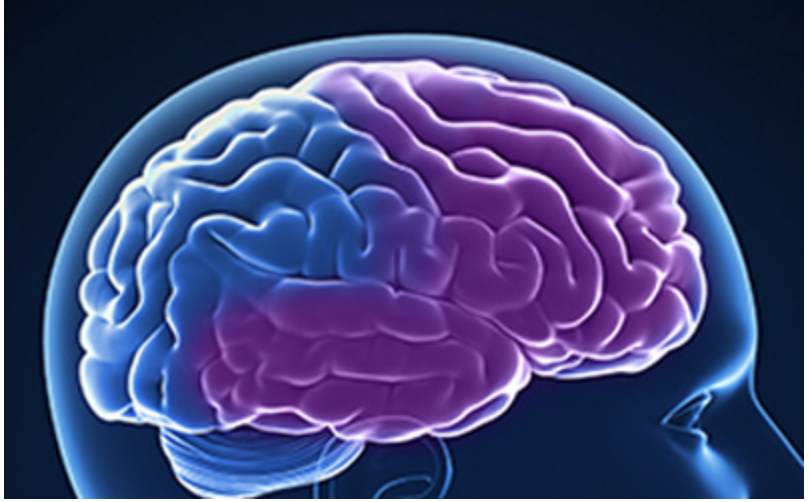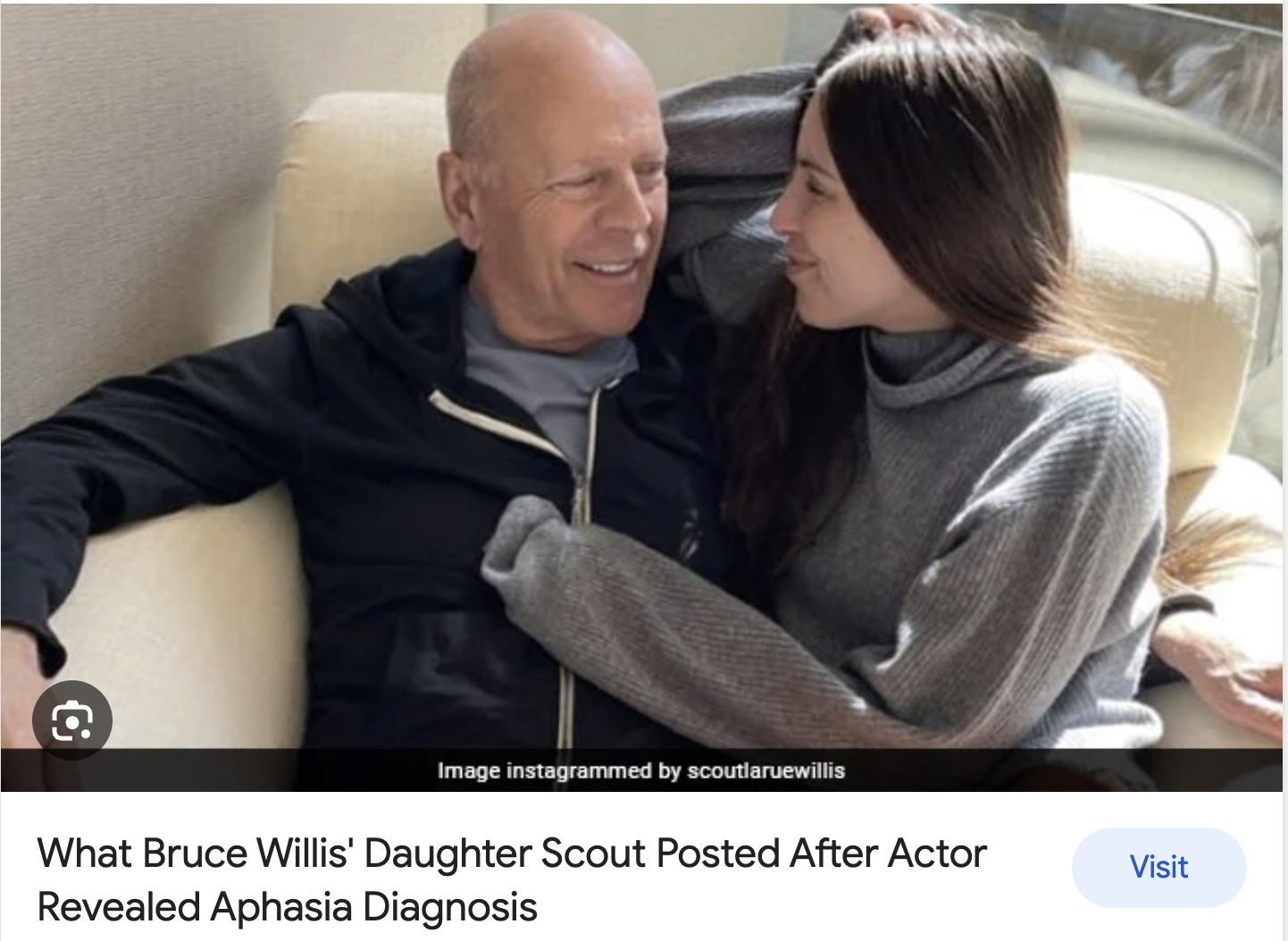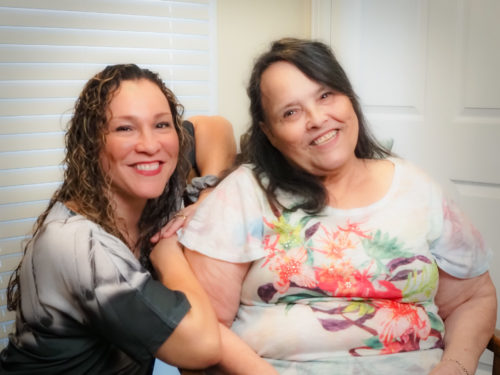
Hello, dear readers! Today, we’re going to talk about something very important: Frontotemporal dementia (FTD), a challenging condition that can affect families just like yours. But don’t worry, we’re also going to discuss a beautiful way to preserve happy memories through photography. It’s what we do here at Doggies for Dementia Foundation!
Frontotemporal Dementia: What Is It?
Frontotemporal dementia, often called FTD for short, is a disease that affects the brain. Imagine your brain as the control center for everything you do – thinking, talking, feeling, and remembering. FTD changes this control center, making it hard for people to behave and communicate as they once did.

The part of the brain impacted by FTD is in purple. (Alz.org)
Imagine a puzzle where the pieces no longer fit together properly. That’s what happens in the brains of people with FTD. It can be very confusing and scary, not just for the person with FTD, but also for their family and friends.
FTD is the most common form of dementia for people under 60 years old. It represents a group of brain disorders caused by degeneration of the frontal and/or temporal lobes of the brain.
According to the Association for Frontotemporal Degeneration -FTD’s estimated U.S. prevalence is around 60,000 cases (Knopman 2011, CurePSP), and many in the medical community remain unfamiliar with it. FTD is frequently misdiagnosed as Alzheimer’s, depression, Parkinson’s disease, or a psychiatric condition. On average, it currently takes 3.6 years to get an accurate diagnosis.

Bruce Willis’ Journey with FTD
You may know Bruce Willis as a famous actor, but did you know he’s also a real-life hero to his family? He and his family have recently been open about his diagnosis with FTD, which takes a lot of courage. They’ve shared their stories, challenges and images to help the world understand their perspective and to help others along their own dementia journey. 
FTD can affect anyone, even celebrities like Bruce Willis. But remember, having FTD doesn’t make a person any less lovable or special. It’s just another challenge in life.
Willis Family Statement-Association of Frontotemporal Degeneration

Photography: A Window to Happiness
Frontotemporal degeneration also referred to as frontotemporal dementia can be a challenging journey for families, but it doesn’t mean the end of happiness. Through photography, you can create a beautiful bridge to your loved one’s past, preserving precious memories and sharing moments of joy, even when words fail.
So, don’t forget to pick up that camera and start capturing the moments that matter most. You can also contact us here at Doggies for Dementia Foundation and we can work toward a special photo session for your family. 
We offer unique photo session and six matted images at no charge to families. Yes, it’s true! Offering support in the way of photography is part of our mission. You’ll be amazed at how a simple photograph can become a powerful tool for love and healing on this challenging journey with FTD. Photos certainly mean the world to families.


Lizel and her daughter Jessica
Lizel had mixed dementia-vascular and frontotemporal dementia, and we met her and her daughter Jessica when we photographed them with Doggies for Dementia. Jessica went on to create The Proactive Caregiver, a wonderful collection of resources (website, podcast, blog…) and book. Be sure and take a look. They’re so close to our hearts.

Common Signs and Symptoms Frontotemporal Dementia
- Personality Changes: Sometimes, people with FTD start acting differently. They might do or say things that are unusual or not very polite
- Language Problems: FTD can make it hard for them to talk or understand words. It’s like having trouble with talking and listening.
- Memory Problems: While their memory isn’t as bad as in some other conditions, they might forget things more often than before.
- Difficulty with Social Interactions: People with FTD might find it tough to get along with others. They may not understand how to be a good friend or notice when someone’s upset.
- Lack of Inhibition: Some folks with FTD lose their filter. They might say or do things without thinking, like telling secrets or eating too much.
- Repetitive Behaviors: Doing the same thing again and again is common in FTD. They might repeat words, actions, or routines.
- Loss of Insight: Many times, people with FTD don’t realize they’re changing. They may not know they need help.
- Difficulty with Planning and Organization: FTD can make it hard to plan things or keep things organized. It’s like struggling with making a schedule or keeping a clean room.
- Mood Changes: FTD can affect how they feel. They might seem sad, not care about things, or feel too happy about everything.
- Motor Symptoms: Some people with FTD have trouble with moving their body. They might feel weak, clumsy, or have a tough time doing physical activities.

 Remember, FTD can be different for each person, and these changes happen because of problems in their brain. If you know someone who has these issues, it’s essential to talk to a medical provider.
Remember, FTD can be different for each person, and these changes happen because of problems in their brain. If you know someone who has these issues, it’s essential to talk to a medical provider.
Be sure check out this BLOG about a beautiful daughter-mother who experienced FTD and went on to do wonderful things for others.


